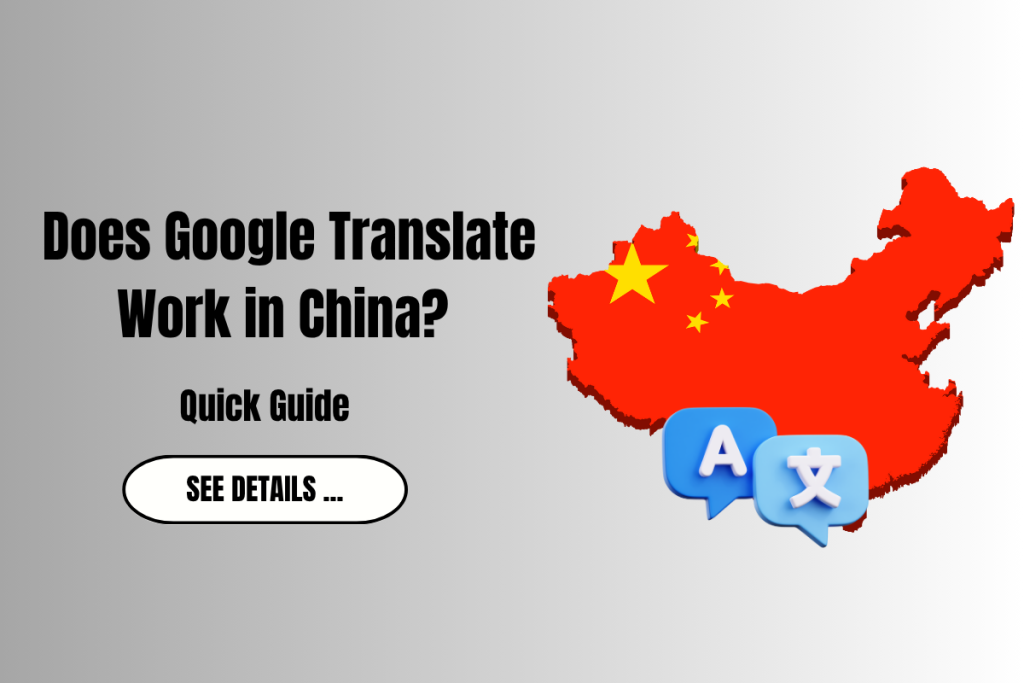Google Translate doesn’t work in China without a VPN due to government internet restrictions. This often surprises travelers who rely on Google services for communication. Fortunately, several effective alternatives exist, including local translation apps, offline language packs, and basic Mandarin phrases.

I. Does Google Translate Work in China?
No. Google Translate is not available in Mainland China. This popular translation tool, like most Google services, cannot be accessed through normal means when you’re inside China’s borders.
- Blocked since 2022 – Google officially discontinued Translate services in Mainland China in 2022
- Redirect attempts blocked – The system tries to send users to the Hong Kong version, which is also inaccessible in China
- No Google services work – This aligns with China’s overall blocking of Google products including Search and Gmail
Travelers needing translation in China should use alternatives like Baidu Translate, Microsoft Translator, or local apps such as Youdao Dictionary. A VPN can also restore access to Google services while in China.
II. Why Google Translate Is Blocked?
Google Translate is blocked in China due to a combination of political and business factors. The Chinese government maintains strict control over internet services through its “Great Firewall” system, which filters and blocks content deemed sensitive or competitive with domestic alternatives.
- Government censorship – China’s internet regulations require companies to comply with local censorship laws, which Google has historically resisted
- Local competition protection – Chinese alternatives like Baidu Translate and Tencent Translate dominate the market and receive government support
- Ongoing tensions – Google’s 2010 exit from China’s search market after refusing to censor results created lasting friction with authorities
For travelers, this blockage creates real challenges. Tourists accustomed to relying on Google Translate suddenly find themselves without their familiar translation tool upon arriving in China. This makes it essential to download alternative translation apps before your trip and familiarize yourself with local options that function within China’s internet ecosystem.
III. How to Access Translation Services in China
Traveling in China presents a language challenge since Google Translate is blocked. Here are effective solutions to overcome this barrier.
VPN Options for Translation Access
VPNs can help you access blocked translation services:
- Bypasses restrictions – Routes your connection through international servers to access Google Translate
- Reliability issues – Government monitoring makes VPN connections unstable
- Performance problems – Slow speeds and disconnections can occur at crucial moments
Many travelers find VPNs frustrating due to these limitations, especially when needing quick translations.
eSIM Solutions for Seamless Translation
eSIMs offer a more dependable alternative for translation needs in China:
- Digital technology – Works without physical SIM cards, activating with a simple QR code scan
- Instant connectivity – Get online immediately upon landing in China
- No VPN required – Access translation apps directly without additional software
Two recommended options for travelers:
- China Unlimited Data eSIM – High-speed internet with unrestricted access to translation tools
- China-Hong Kong-Macau eSIM – Perfect for regional travelers visiting multiple destinations
With an eSIM, you can reliably use translation apps throughout your China trip without connectivity worries or government restrictions. This solution provides peace of mind when navigating language barriers in unfamiliar territory.
IV. Tips for Overcoming Language Barriers in China
Navigating China without speaking Mandarin is possible with the right preparation. Here’s how to communicate effectively during your trip.
Essential Communication Strategies
A few practical approaches can solve most communication challenges:
- Learn key phrases – “Nǐ hǎo” (hello), “Xiè xiè” (thank you), and “Duō shǎo qián” (how much) will help daily
- Use translation apps – Camera translation features instantly decode menus and signs
When apps fail, simple gestures and pointing often work just as well. Most locals appreciate any effort to speak their language, even if it’s just basic phrases.
Making Social Connections
WeChat is essential for communication in China. Its built-in translation feature helps you chat with new local friends.
Always carry with you:
- Written addresses – Your hotel name in Chinese characters for taxi drivers
- Pictures of destinations – Visual aids help when asking for directions
These simple strategies make language barriers less intimidating and help you enjoy a more authentic China experience.